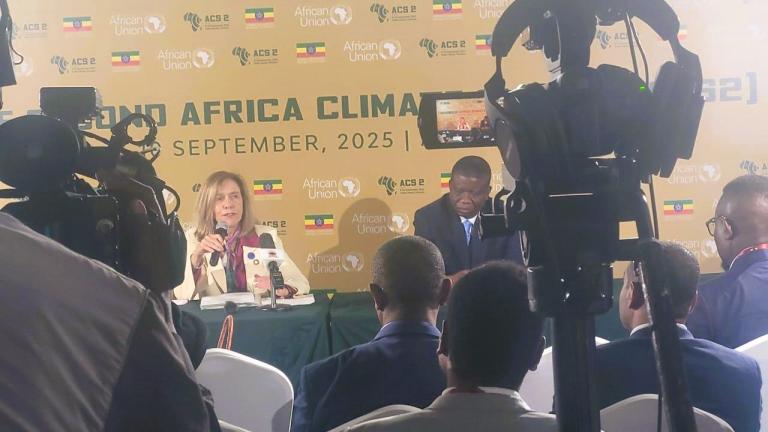The Second Africa Climate Summit in Addis Ababa issued a clear call from leaders to move from rhetoric to action and to position the continent as a driving for solutions - a call echoed by the World Meteorological Organization.
Co-convened by the Federal Democratic Republic of Ethiopia and the African Union Commission the Summit from 8-10 September took the theme: "Accelerating Global Climate Solutions: Financing for Africa's Resilient and Green Development."
A WMO delegation headed by Secretary-General Celeste Saulo and Assistant Secretary-General Thomas Asare took part in high-level panels and a series of bilateral meetings to highlight progress and challenges in key priorities including strengthening observations and data exchange in Africa and boosting resilience. They highlighted the paramount importance of greater financing and institutional support for National Meteorological and Hydrological Services who are on the frontline of climate intelligence and security.
In his keynote address, H.E Prime Minister Abiy Ahmed (PhD), Federal Democratic Republic of Ethiopia urged the world to reframe Africa's role in climate action .
"Too often, Africa's story at climate summits begins with what we lack-finance, technology, time. Let us begin instead with what we have," he declared. He cited Africa's young and vibrant population; a rapidly growing solar belt; a home for vital carbon vaults-our forests, wetlands, and coasts; and vast arable lands.
Prime Minister Abiy proposed launching the African Climate Innovation Compact - a continent-wide partnership uniting universities, research institutions, startups, rural communities, and innovators.
The Compact aims to deliver 1,000 African climate solutions by 2030 across energy, agriculture, water, transport, and resilience. Structured around five pillars - innovation discovery, financing, knowledge development, policy enablement, and public engagement, it will be backed by a blended financing model targeting $50 billion annually.
Early Warnings for All Action Plan for Africa
This model has clear synergies with initiatives pursued by WMO, including the Early Warnings for All Action Plan for Africa to protect everyone with life-saving early warning systems by 2027.
Celeste Saulo called on African governments and decision makers to embrace responsible innovation. Artificial Intelligence is already revolutionizing forecasting and must be deployed everywhere to help African countries with limited computing capacity to leapfrog to more advanced capability.
"Only about 40% of Africans currently have access to Early Warning systems -the lowest rate of any region. And we know that early warnings can deliver a ten‑to‑one benefit - even higher in Africa. But to achieve better systems we need more data, and we need this data to be shared. Forecasts and warnings are only as good as the observations they are built on," said Celeste Saulo.
"The Global Basic Observing Network and the Systematic Observations Financing Facility - SOFF - are two important tools to close dangerous data gaps. Our goal: better forecasts, smarter decisions, and ultimately, more prosperity, smart economic choices, and more lives saved," she told a high-level event on drought.
Germany alone has more reporting stations which comply to international standards than the entire African continent. To address this, WMO, together with UNDP and UNEP, established SOFF, which is already supporting 24 African countries with over USD 60 million in approved funding.
SOFF provides not only initial investment but also long-term grants and peer-to-peer technical assistance. It is now pioneering innovative financing through a new SOFF Impact Bond, designed to mobilize resources from a wide range of partners. This will enable African countries to increase internationally shared weather and climate data fivefold, cutting forecast errors in high-impact areas by over 30 percent, WMO Assistant Secretary-General Asare told a side event.
The Climate Risk and Early Warning Systems Initiative (CREWS) is another important facility promoting resilience in Africa and beyond. CREWS assists vulnerable countries in enhancing their capacity to produce and deliver life-saving early warnings. CREWS focus on the "last mile" making sure that early warnings actually reach at-risk communities.
The multilateral climate funds and development banks provide significant resources. In serving Africa's climate resilience priorities, every project in agriculture, water, energy, and infrastructure must include climate services and early warning components. This alignment will ensure that every climate dollar also buys protection and preparedness, he said.
The WMO delegation held a series of bilaterals with government delegations, philantrophic organizations and the private sector. This included with Vice President of the Republic of The Gambia, H.E. Muhammad B. S. Jallow who voiced his commitment to Early Warnings For All.
WMO pledged support to help rebuild the national meteorological service of Somalia - shattered by years of insecurity.
"There is a well-known African proverb: If you want to go fast, go alone. If you want to go far, go together. This speaks to the value of teamwork and collaboration," said Celeste Saulo.







